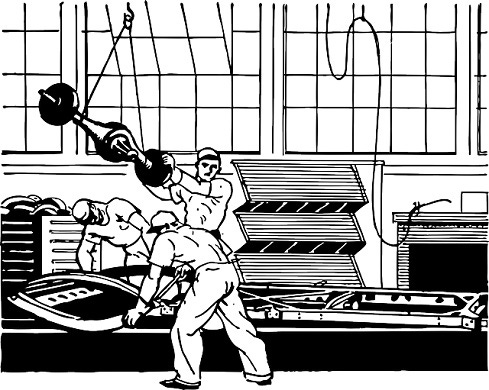AI and the Death of 'Employment for Life'
When AI brings about job losses and changes our careers, remember that we've been through this before, time and again.

There's a fear that stalks artificial intelligence, and it's spreading faster than any seasonal flu in a school filled with runny-nosed kids. Just mention AI to a small group of your peers and someone is sure to say, "But it's going to put us out of work."
Yup, it's going to put some -- maybe many -- people out of work. We can't sugar-coat that fact. It stinks to lose a job.
However, I want to offer some perspective based on my (ahem) years in the workforce. Truth is that I got my first full-time, "permanent" job in 1971 at a Boston newspaper. Talented, hard-working people had been losing jobs long before then, and have been ever since, in all types of industries, not just newspapers. Sometimes it's a result of technology developments, sometimes market consolidation, and sometimes poor management.
Personally, I've survived waves of cuts at several employers, and in a couple of cases my own job disappeared.
I've learned that the elimination of "employment for life" doesn't have to be the end of the world. Yet, the bigger lesson that I've learned in almost 50 years is that some degree of job loss is natural. Whatever job havoc AI brings about won't be unique, and, yes, new jobs are going to get created.
Take a moment to consider how the employment realm has changed in our lifetimes, even if you have been around for many fewer years. Think of the jobs that are no more. Do you really miss any of them? How many were jobs that people didn't really enjoy doing anyway?
Even in my teens my part-time and summer jobs included things like working on farms, delivering milk, and (fun, fun, fun) handling steaming hot hides, treated with who-knows-what toxins, in a tannery. Those jobs are going, going, and gone.
The loss of jobs to computers and automation really hit in my first decade in the workforce. Think of the millions of people who lost their jobs to technology, including direct dial and the PBX. Computers eliminated telephone operators -- working for Ma Bell or at corporate switchboards -- telephone installers and linemen, even people who published phone books.
How about company receptionists, data entry clerks, and the typist pool? Walk into many companies today and the "receptionist" is a phone or an iPad. I remember when company mail clerks made delivery and pick-up rounds three times a day with carts full of envelopes and packages. No more! I get maybe one piece of business mail a month now, but no shortage of email.
My company had a dedicated typewriter repairman (yes, like many other roles, it was always a man), who I guess was a predecessor to the PC tech and printer/copier service rep. PC techs weren't even on the radar in 1971, but now PCs are trending toward disposability, and the techs are preparing for new careers, I hope.
Fifty years ago, IT (called MIS) jobs were about swapping tape reels, scheduling jobs, and keying in print commands. Anyone miss stacks of green-bar printer paper? Relatively few jobs existed in computer manufacturing and mainframe programming. Those programmers focused on one type of application, built with one language, on one hardware platform, perhaps for their entire career. Our adoption of technology has opened up hundreds of career options for today's tech workforce.
Now, think of the jobs that disappeared from our personal lives. Sorry, TV repairman, broken televisions go out on electronics recycling day, or get dumped in the woods. New wash-and-wear fabrics have led to the shuttering of most dry cleaners. Good luck finding a neighborhood tailor or a cobbler. Market shifts and our own personal lifestyle preferences put them out of work. Tech is turning career cabbies into Uber and Lyft drivers. You probably can name a dozen other jobs that are no more.
But what else do we know about automation, computers and tech in general?
The last quarter of the 20th century saw the rapid rise, and fall, of the minicomputer and PC manufacturers, and legions of server and PC application developers. The deaths of the typewriter and hard-wired telephone helped to give us Silicon Valley, the Route 128 belt near Boston, and the tech scenes of Seattle, Austin and Research Triangle. Think how many millions of jobs came out of nowhere, jobs that couldn't have been imagined even 10 years before. Could PC software developers in 1990 have imagined that their next career would be writing "apps" for smart phones or building websites?
Today, every big city has its own tech/innovation/maker section, and attracts a flood of bright, talented people with dreams of building the next great company. Watch on any morning how many tech workers flock to huge complexes of big pharma and biotech buildings, making the drugs of the 20th century seem like the buggy whips of their time. We have a global "information economy" yet most of us still work 40-hour weeks in jobs that are different than they were even 20 years ago.
Someone is bound to ask, "So, Jim, what will the new jobs of the 2020s be?" I don't know. If I was a great prognosticator I would be busy spending one of those big lottery jackpots right now. What I do know is what I've seen over the decades. Our jobs will change, and we must be open to those changes. If we don't embrace change we won't find a home in the future workforce. Now, like 1971, isn't a time to say we've always done it this way.
I speak as a member of a profession that has seen its share of mass layoffs and change. We've transitioned from reporters to "journalists" and "bloggers." The irony is that there are more of us than ever making a living stringing words together. Talk about change: At this point I'm happy to be writing about future technology on a computer in my home office so you can read it on the phone you keep in your pocket. It sure beats banging on a manual typewriter in a smoke filled 1970s newsroom writing about crooked politicians and Mafia bosses.
For more about AI and the future of work, check out these recent articles.
10 Ways AI Will Alter the Future of Work
AI & Machine Learning: An Enterprise Guide
About the Author
You May Also Like






